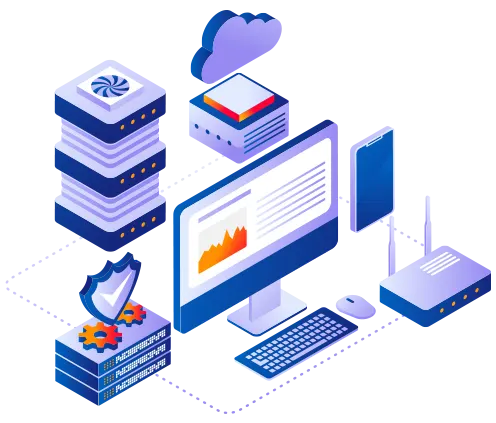 Server
Colocation
Server
Colocation
 CDN
Network
CDN
Network
 Linux Cloud
Hosting
Linux Cloud
Hosting
 VMware Public
Cloud
VMware Public
Cloud
 Multi-Cloud
Hosting
Multi-Cloud
Hosting
 Cloud
Server Hosting
Cloud
Server Hosting
 Kubernetes
Kubernetes
 API Gateway
API Gateway

Experience Autoscaling in Cloud Computing like never before with Cyfuture Cloud! Automatically adjust resources based on demand, ensuring unmatched performance, cost savings, and reliability.
Cyfuture Cloud offers Autoscaling Cloud Computing powered by VMware's NSX Advanced Load Balancer, operating on a sophisticated elastic fabric architecture. This architecture acts as a dynamic framework, allowing the scaling of SEs (Service Engines) and application servers in response to fluctuating demands in workload, seamlessly adapting their capacity in real-time through cloud auto scaling.
This autoscaling cloud computing mechanism delves into a granular level, incorporating specific parameters related to CPU and RAM scaling. When load variations occur, Cyfuture Cloud's system intelligently adjusts these resources, dynamically allocating computing power and memory based on the immediate requirements of the workload, ensuring efficient cloud auto scaling.
What sets this apart is not just the utilization of inherent cloud capabilities but also the active management and optimization of these resources. NSX Advanced Load Balancer not only harnesses the elasticity of cloud environments but also leverages intricate metrics and data gathered within its ecosystem. By interpreting and acting upon these metrics, it orchestrates a sophisticated allocation of resources, ensuring optimal performance, efficient cloud auto scaling, and capacity management in real-time scenarios. This meticulous approach helps in maintaining high availability, dynamic resource utilization, and intelligent scaling, meeting demands without compromising on performance or reliability.
With Cyfuture Cloud, you can experience the following scaling features along with schedule and predictive scaling
Autoscaling minimizes the need for over-provisioning and cuts unnecessary costs by ensuring you only pay for resources when they are needed.
Autoscaling ensures continuous availability, allowing businesses to remain operational even during demand spikes.
Autoscaling enhances performance by automatically responding to fluctuations in load, ensuring smooth and uninterrupted service.
Businesses can react to demand changes without manual intervention, allowing them to focus on growth
By using NSX Advanced Load Balancer policies, both types of scaling can be done automatically.
It supports the above-mentioned autoscaling features in all ecosystems.
SEs are capable of processing a maximum amount of traffic and are usually measured by the traffic throughput or SSL transactions per second of a SE. This SE capacity is a function of a variety of factors, such as the size of the SE VM (number of cores or memory), the type of traffic, and the ecosystem within which the SE is running.
Virtual services are typically placed on a single SE in the default configuration of a system. It is possible, however, to scale out the virtual service to other SEs in the event that the SE alone is not enough to handle the traffic for the virtual service. As a result, the traffic of the virtual service is handled by more than one SE at the same time.
Virtual services that need to be scaled out or scaled in can either be done manually or automatically.

If you wish to configure thresholds beyond which a virtual service should be scaled out to a new SE, or scaled back into fewer SEs, then one of these SE parameters can be used to configure the thresholds beyond which a virtual service should be scaled into a new SE:

CPU utilization of the SE

Bandwidth, in Mbps, being served by the SE
 being served by the SE-ac.webp)
Connections per second (CPS) being served by the SE
-ac.webp)
Packets per second (PPS)
As part of the virtual service load balancing, it is equally important to ensure that enough capacity is available at the application instance tier to handle traffic loads in conjunction with virtual service load balancing.
In light of the fact that public cloud infrastructure is charged based on usage or uptime, it is important to have enough capacity based on usage, as well as the flexibility to scale resources on demand.
Autoscaling is a feature provided by public clouds. It is possible to create virtual machines and configure them based on the templates for autoscaling servers. A scale-out or scale-in can be done either manually or based on a certain set of load conditions that are present at the time.

At Cyfuture Cloud, we offer Autoscaling Services designed to support businesses of all sizes. Our offerings provide advanced tools to help manage cloud infrastructures more efficiently, delivering optimal resource management and enhanced performance.
Our On-Demand Autoscaling feature ensures that your cloud resources adjust based on real-time requirements. Whether it’s handling unexpected traffic surges or optimizing operations during quiet periods, our system is designed to respond instantly and appropriately.
Using advanced machine learning algorithms, our Predictive Autoscaling services forecast future needs based on historical usage data, ensuring that your infrastructure is always prepared for future demands. This not only saves costs but also improves performance consistency.
For businesses that prefer to focus on core functions, our Managed Autoscaling Services provide complete end-to-end management of your autoscaling needs. From configuration to monitoring, we handle everything, so you don’t have to.
At Cyfuture Cloud, we approach autoscaling with a focus on maximizing value and simplifying cloud management for our clients. Our process includes:
Different industries have unique demands, and at Cyfuture Cloud, we offer Industry-Specific Autoscaling Solutions for sectors such as:

Our unparalleled domain expertise and strong cloud migration capabilities ensure transition and implementation as smooth as breathing itself.

Our reliable, agile, and high performing data centers and migration premises make the sophisticated processes prompt, convenient, and safe to work on.

Cyfuture always provides its service offerings in full adherence to our client’s requirements and market conditions. You get an instant access to the resources you need.

When you get cloud much swifter along with high performing, deft, and scalable solutions, you can get back to working on the core competencies of your business.

We help businesses to get an IT infrastructure makeover with no hassle.

State-of-the-art infrastructure capable of handling diverse and advanced workloads
Our partnerships with leading cloud service providers like Google, Amazon, Microsoft & Alibaba help us create robust Multi-Cloud architectures
Living up to our reputation of being a custom-centric cloud service provider, we let you customize our offering to fit your size and scale.
A wide range of payment options optimize pricing and trim down the total cost of ownership (TCO).
Autoscaling automatically adjusts cloud resources like CPU, RAM, or instances based on real-time demand. It ensures efficient resource utilization and cost optimization.
By scaling resources dynamically during traffic spikes, autoscaling maintains optimal performance and ensures application availability without manual intervention.
Autoscaling is typically categorized into horizontal scaling (adding/removing instances) and vertical scaling (adding/removing CPU or RAM within instances).
Yes, autoscaling helps reduce costs via dynamically adjusting sources so that you're only charged for what is needed during high or low-demand periods.
Autoscaling is pleasantly suited for applications with variable workloads, like e-commerce sites or media platforms, where traffic fluctuates.
Predictive autoscaling uses machine learning to forecast destiny demand based totally on ancient records, enabling proactive resource adjustments.
While it enhances availability, autoscaling can't assure 100% uptime. It depends on cloud provider SLAs, machine architecture, and network reliability.
Yes, maximum cloud systems allow users to set custom autoscaling rules based on specific software needs, along with CPU thresholds or memory limits.

Let’s talk about the future, and make it happen!
By continuing to use and navigate this website, you are agreeing to the use of cookies.
Find out more
 Precisely targeted customer relationship enhancement, with up-sales for NYSE-listed manufacturer
Precisely targeted customer relationship enhancement, with up-sales for NYSE-listed manufacturer
 Servicing customers across India, with highly region-specific focus, for a consortium of Fortune 500 OMCs
Servicing customers across India, with highly region-specific focus, for a consortium of Fortune 500 OMCs


